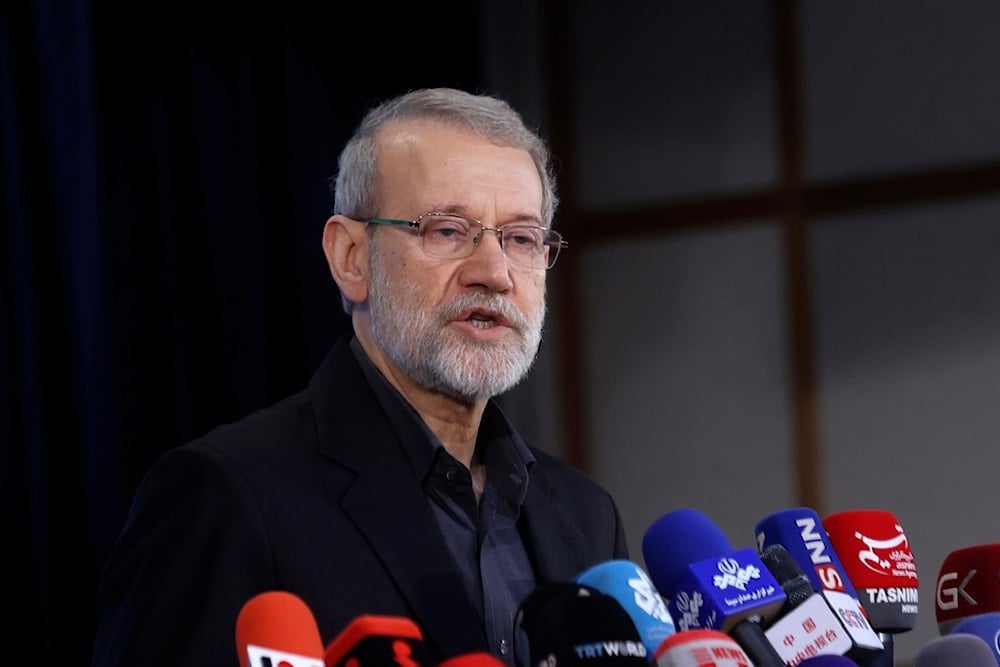'Israel' failed to topple Iran, lost 12-day war, Larijani says
Ali Larijani says “Israel” aimed to collapse Iran in 6 days but failed, revealing assassination plots, US base strikes, and calls to rethink diplomacy.
-

Former Iranian parliament speaker Ali Larijani speaks with media at the Interior Ministry in Tehran, Iran, Friday, May 31, 2024. (AP)
The Israeli regime and the United States both plotted to bring down the Iranian government in under a week, said Ali Larijani, senior advisor to the Leader of the Islamic Revolution in Iran. "They believed they could end the Islamic Republic in five or six days," Larijani added. “Netanyahu’s main goal was the surrender of the Iranian people.”
Larijani added that the plot extended beyond strikes targeting the leadership. “After planning to target the heads of the three branches of power, Israel intended to move on to assassinate the Leader of the Revolution, Sayyed Ali Khamenei,” he disclosed.
The Iranian official emphasized that this plan reflected a deep misunderstanding of the Iranian nation. “The Zionist enemy and the United States failed to grasp the culture and historical depth of the Iranian people,” Larijani said.
'They told me I had 12 hours to flee'
Recounting a personal threat he received during the war, Larijani revealed: “I received a call warning me that I had 12 hours to leave the country or I’d be killed.”
He described a turning point in the conflict on Saturday, June 21, when mediators began to intervene. “They realized Israel had reached a dead end,” Larijani said, noting that by Monday, June 23, Tel Aviv began scrambling for a ceasefire.
“They thought we would beg,” he said, “but by the end of the war, they were the ones begging.” Larijani pointed to The Guardian’s post-war analysis: “The Islamic Republic turned out to be far stronger than the US and Israel had assumed.”
Larijani unequivocally declared the war a failure for Tehran's adversaries. “The enemy was defeated in this battle,” he said, stressing that attempts to destabilize Iran through psychological warfare and internal division had backfired.
He added that Iran’s missile capabilities had shifted the balance of power, and that this played a decisive role in forcing the Israeli regime into a strategic retreat.
IAEA chief among the losers of the 12-day war
Larijani also criticized Rafael Grossi, Director General of the International Atomic Energy Agency (IAEA), for his role in the crisis. “Grossi was one of the facilitators of the 12-day war,” he charged. “He failed to do his duty.”
Larijani questioned the value of Iran’s continued participation in the Nuclear Non-Proliferation Treaty (NPT). “Why should we remain committed to the NPT?” he asked, emphasizing, “Nuclear knowledge will never leave Iran.”
He added that the Iranian nuclear file was merely a pretext used to justify aggression: “It was never about the nuclear issue. It was about weakening the state.”
'It’s time to reassess diplomacy'
According to Larijani, Iran must now “reconsider two key issues: negotiations and cooperation with the IAEA.” He also pointed out the silent role of three European countries backing the Israeli occupation throughout the war, without offering Iran any support in return.
“China and Russia,” he said, “realized the limits of American power during this war.”
Larijani concluded that Iran’s victory resonated globally: “All nations rejoiced in our triumph—even though we lost 18 senior commanders.”
Iranian missiles struck US base in Qatar
Larijani confirmed that Iran had directly hit a US military base in Qatar. “Six missiles with 400-kilogram warheads struck the base with precision,” he said. He accused US President Donald Trump of covering up the scale of the losses: “Trump falsely claimed only one missile hit the target.”
He continued, “At the beginning of the confrontation, Trump said he would wait two weeks to see what happens with Iran. But just two days later, he escalated.”
On the 10th day of the war, Larijani said, Trump ordered strikes on Fordow, Isfahan, and Natanz nuclear facilities. “The US Secretary of Defense rushed to claim that Iran’s nuclear infrastructure had been destroyed, attempting to deceive American and global public opinion,” he added.
Iran foiled Israeli plans
Ali Shamkhani, advisor to the Leader of the Islamic Revolution and the Islamic Republic of Iran, revealed that an Israeli assassination attempt against him had failed. Speaking in an interview with Iranian television, Shamkhani stated that he is aware of the motive behind the attempt but cannot reveal it at this stage. "I taught them a harsh lesson," he said.
Shamkhani explained that Tehran had recognized from the beginning that negotiations with the United States were not genuinely aimed at achieving an agreement. Instead, he said, the talks were used to create an atmosphere conducive to internal agitation and destabilization within Iran.
He emphasized that Iran's leadership had been fully prepared for any scenario, noting that "leaders were replaced within just 12 hours" and that all operations following the attempt were carried out according to pre-established plans. This preparedness, he added, reflected the country's robust military and security posture against any form of escalation or infiltration.

 5 Min Read
5 Min Read










